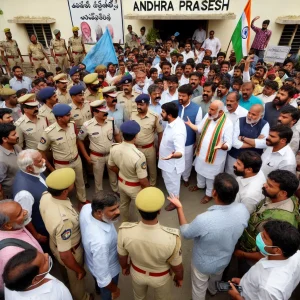
The recent press meeting held by Chief Minister N. Chandrababu Naidu on the Tirumala tragedy has sparked widespread outrage and ignited a larger debate on political accountability and governance in Andhra Pradesh.
Naidu began his address by highlighting his participation in a ₹20 lakh crore investment meeting with the Prime Minister, stating that he received news of the Tirumala incident only afterward. However, his failure to offer condolences to the victims and instead focusing on self-promotion has drawn sharp criticism. He attributed the tragedy to the token system introduced by the previous government, distancing himself from accountability by claiming it was implemented before his tenure.
What shocked many were his remarks targeting the opposition. Naidu accused them of creating the flawed system that allegedly led to the incident and stated, “God will not forgive those who are the reason for this.” These comments have been widely criticized as politically charged and lacking sensitivity, with critics questioning the invocation of divine retribution in the context of human suffering.
On social media, citizens have questioned why, if the token system was indeed flawed, corrective measures were not taken during Naidu’s governance. Instead of addressing systemic failures or proposing solutions to prevent such tragedies, he appeared to shift blame. This has fueled public frustration, with many viewing his remarks as an attempt to exploit the tragedy for political gain rather than addressing its root cause. Others questioned why the flawed system was allowed to continue without reform, pointing out the lack of accountability across successive governments. Many have emphasized that public safety at a revered site like Tirumala should have been a top priority.
The incident has now transcended beyond political blame, becoming a reflection of broader governance challenges in Andhra Pradesh.




